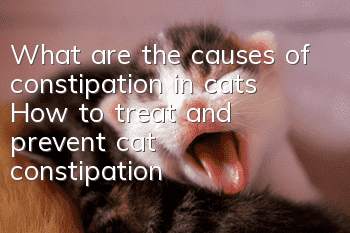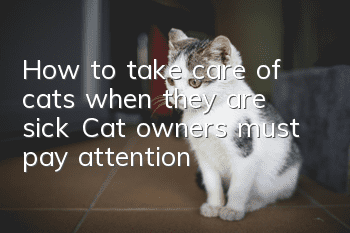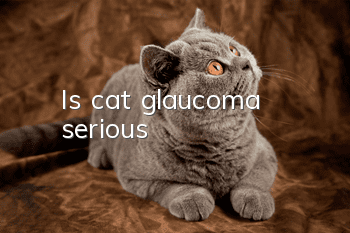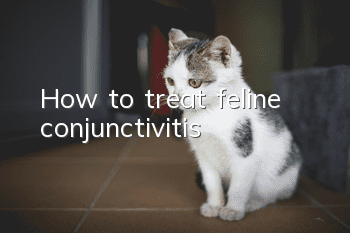What are the causes of constipation in cats? How to treat and prevent cat constipation?

Analysis of the causes of constipation in cats
Like humans, cat constipation can range from mild to severe, but it should be noted that the longer a cat is constipated, the more difficult it will be to treat it. Feline constipation, also known as fecal secretion, is a digestive system disease characterized by stagnation and drying of intestinal contents, resulting in incomplete or complete obstruction of the cat's intestines. There are three main causes of constipation in cats:
1. Feeding and management: Factors such as long-term feeding of dry food, lack of drinking water, eating human hair and foreign objects, lack of exercise, and sudden changes in feed, environment, and management may all induce this disease.
2. Diseases: Painful defecation diseases (such as rectal polyps, proctitis, rectal stricture, tumors, anal abscess, etc.), constipation occurs due to the disappearance of the normal urge to defecate.
3. Self: Diseases with defecation movement disorders (such as medullary joint dislocation, pelvic fractures and hind limb fractures, etc.) can cause constipation.
Clinical symptoms of constipation in cats
Cat constipation will also have different symptoms as the disease progresses. Generally, cat constipation is caused by dry diet, lack of drinking water, gastrointestinal diseases, movement disorders and other reasons. If your cat shows the following symptoms, you should pay attention to observe whether the cat has constipation problem.
1. Forced defecation in the early stage. Early symptoms of constipation can be observed. The sick cat defecates very hard and excretes a small amount of dry stool with mucus, or a small amount of foul-smelling loose stool, indicating a tendency to become ill.
2. Uneasiness in the later stages of illness. In the later stages of illness, sick cats will show uneasiness, become nervous easily, scream, get angry and want to scratch people, try to defecate but cannot easily defecate, frequently look back at the abdomen, and lick the abdomen.
3. Severe constipation and bloating. It causes loss of appetite, or not eating anything, and the spirit is not as lively and depressed as before. There was vomiting, obvious tenesmus, abdominal distension, and intestinal distention.
Preventive measures for cat constipation
There are many causes of constipation in cats. If you want to treat constipation in cats, you must find out what the cause is so that you can treat it symptomatically. If you want to prevent cat constipation in daily life, you must start from all aspects of life.
1. Daily feeding precautions
When feeding, you should pay attention to the mix of cat food. Especially for elderly cats, you should increase food containing more fiber, and do not let cats eat food that is not easy to digest. Do not let pets feel thirsty or lack of water, and ensure adequate daily water supply.
2. Strengthen exercise examinations
Strengthen the cat's exercise, and don't let them eat until they are full and sleep, or wake up to eat. Check your cat's anal glands regularly. Life details to prevent constipation in cats.
3. Give enough fiber
Give the cat more fiber, such as cat food or prescription food with added grains, or grow wheat at home for the cat to eat. You can also buy laxative hair cream for cats on the market. Cat.
Treatment methods for cat constipation
Cat constipation can be observed in the initial stage of cat defecation. If no treatment is given in time at this time, cat constipation will be more difficult to treat later. The simplest method is to use Kaiser Lu, but cats are sensitive and can easily struggle. If the owner does it himself, he must be careful not to injure the cat or himself. The editor has compiled for you common daily methods to treat cat constipation.
1. Mild enema therapy
Suitable for mild and simple constipation. Use 40-80 ml of warm soapy water, pour it into the intestine with an enema, and use external abdominal pressure to moderately press the fecal mass in the intestine. Generally works.
2. Use drug treatment
When a cat is sick, an appropriate amount of oral laxatives can be given. For example, 5-30 grams of magnesium sulfate or 5-50 ml of liquid paraffin oil should be used under the instructions of a doctor to avoid harming the health of the cat.
3. Severe surgical treatment
If you have tried many methods but to no avail, you may need to take your cat to the doctor for severe constipation or the inability to pass stool normally. If the above methods do not work, you can perform surgery to remove the feces from the intestinal cavity.
- What to do about urinary tract infection in cats? Pay attention to prevention in details
- Cat vaccination and internal control were done at the same time
- Do cats have to remove their broken canine teeth?
- Cat bitten the desiccant bag
- Is it too late for a cat to be six months old?
- Why do cats meow before pooping?
- Oral flea repellent for dogs
- Do stray cats prefer freedom or adoption?
- How to massage a female cat when she feels spring
- Touching the cat's belly and kicking it, it bites



